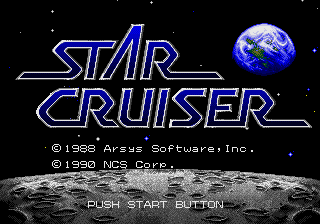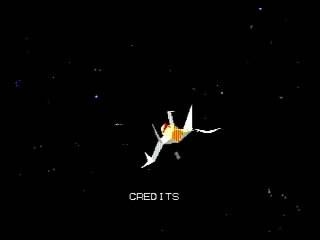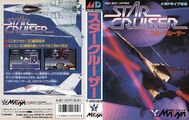Star Cruiser
From Sega Retro
| Star Cruiser | |||||||||||||||
|---|---|---|---|---|---|---|---|---|---|---|---|---|---|---|---|
| System(s): Sega Mega Drive | |||||||||||||||
| Publisher: Masaya | |||||||||||||||
| Developer: Arsys Software | |||||||||||||||
| Licensor: extreme | |||||||||||||||
| Original system(s): JP Home Computers | |||||||||||||||
| Genre: Adventure[1] | |||||||||||||||
| Number of players: 1 | |||||||||||||||
| |||||||||||||||
|
This short article is in need of work. You can help Sega Retro by adding to it.
Star Cruiser (スタークルーザー) is a 1990 adventure game for the Sega Mega Drive by Arsys Software, published by NCS. It is a port of Star Cruiser, which was previously released on various Japanese home computers, including the PC-8801 and PC-9801 in 1988 and the X68000 in 1989.
It is a mixture of the action RPG and first-person shooter genres, with the graphics presented in real-time 3D polygon graphics.
Contents
Overview
| This article needs cleanup. This article needs to be edited to conform to a higher standard of article quality. After the article has been cleaned up, you may remove this message. For help, see the How to Edit a Page article. |
Upon its original 1988 release, Star Cruiser was an ambitious and innovative game years ahead of its time. The game's innovations included fully 3D polygon graphics (including nearly all objects, enemies, and backgrounds, with the exception of distant horizons that were pre-rendered), true first-person shooter gameplay (anticipating the likes of Wolfenstein 3D and Doom), gameplay mechanics such as strafing, fusion of the first-person shooter and RPG genres (anticipating the likes of System Shock and Deus Ex), real-time 3D first-person movement (unlike earlier first-person games which were pre-computed), 3D open-world exploration across a large game universe (spanning several star systems), 3D space flight simulator segments for exploring outer space with six degrees of movement (and fighting enemy spacecraft), a crosshair to target enemies (both on ground and in space), and a portable computer built into the player character's power suit that has various uses (such as displaying an automap and radar). The game had a large open-world game universe, allowing the player to explore over 30 planets across four star systems, making it the earliest example of a fully 3D polygon open-world game.
The game also emphasized storytelling, with an epic sci-fi space opera storyline set in the 27th century, plot twists, character dialogues with NPCs (who have their own background stories), anime style dialogue portraits for characters, visual novel style first-preson cutscenes, animated cutscenes rendered using the game's 3D engine, and a chiptune soundtrack composed by Toshiya Yamanaka using FM synthesis (later released as a seperate original soundtrack CD).
History
Star Cruiser runs on a 3D polygon engine previously used by the 1986 Arsys Software role-playing shooter Wibarm. While Wibarm only used the 3D engine for exploring indoor environments and presented it in a third-person view, Star Cruiser used the 3D polygon engine for the entire game and presented the view entirely in a first-person view.
Legacy
No version has been officially released outside Japan. An English version, retitled Star Quest, was set to be released in North America by Namco in Spring 1994[5] (being previewed at Winter CES 1993 and Summer CES 1993), but was cancelled for unknown reasons (presumably due of dated 3D graphics). An English translaton beta patch was released at ROMhacking in September 2016,[6][7] followed by a complete translation patch in November 2016.[8]
A sequel, Star Cruiser II, was released for Japanese home computers in 1992.
Production credits
- Producer: Keiichi Onogi
- Assistant Producer: Keisuke Yasaka
- Director: Osamu Nagano (Arsys)
- Game Designer: Tux.Yoshimura (Arsys)
- Scenario Writer: K.Y (Arsys)
- Chief Programmer: Nekogeinin (Arsys)
- Programmer: Seiichi Ikiuo (Arsys)
- Graphic Designer: Ryo Yoshimura (Arsys), Biopark Matsuo (Arsys)
- 3D Designer: 3D-Editor Kun (Arsys), Jua. Yamashita (Arsys), Ryo Yoshimura (Arsys), Biopark Matsuo (Arsys)
- Title Designer: Ryo Yoshimura (Arsys)
- Music Composer: Toshiya Yamanaka (Arsys)
- Sound Effect: Toshiya Yamanaka (Arsys)
- Map Designer: Tux.Yoshimura (Arsys), Biopark Matsuo (Arsys), Ryo Yoshimura (Arsys)
- Special Thanks to: Naotaka Taira (Arsys), Yasuo Fuku (Arsys), Shinichi Ito
- Manager: Keiichi Onogi
- Executive Director: Yasumasa Shirakura
- Star Cruiser
- ©1990 NCS Corp.
- ©1988 Arsys Software, inc.
Digital manuals
Magazine articles
- Main article: Star Cruiser/Magazine articles.
Promotional material
also published in:
- Mega Drive Fan (JP) #12: "January 1991" (1990-12-08)[10]
Physical scans
| Sega Retro Average | ||||||||||||||||||||||||||||||||||||||||||||||||||||||
|---|---|---|---|---|---|---|---|---|---|---|---|---|---|---|---|---|---|---|---|---|---|---|---|---|---|---|---|---|---|---|---|---|---|---|---|---|---|---|---|---|---|---|---|---|---|---|---|---|---|---|---|---|---|---|
|
| 54 | |
|---|---|
| Based on 10 reviews | |
Technical information
- Main article: Star Cruiser/Technical information.
References
NEC Retro has more information related to Star Cruiser
|
- ↑ 1.0 1.1 https://sega.jp/history/hard/megadrive/software_l.html (Wayback Machine: 2020-07-02 23:21)
- ↑ File:StarCruiser MD JP Box.jpg
- ↑ Beep! MegaDrive, "December 1990" (JP; 1990-11-08), page 16
- ↑ https://www.amusement-center.com/project/egg/game/?product_id=1662
- ↑ Game Informer, "March/April 1994" (US; 1994-0x-xx), page 50
- ↑ Star Cruiser, a Japanese exclusive Mega Drive shooter, translated into English, Sega Nerds
- ↑ Star Cruiser Receives English Translation by Fans for Sega Genesis Console, Retro Gaming Mag
- ↑ Star Cruiser, ROMhacking
- ↑ File:Star Cruiser MD credits.pdf
- ↑ Mega Drive Fan, "January 1991" (JP; 1990-12-08), page 94
- ↑ Beep! MegaDrive, "January 1991" (JP; 1990-12-08), page 35
- ↑ Famitsu, "" (JP; 199x-xx-xx), page 1
- ↑ Game Informer, "May/June 1994" (US; 1994-0x-xx), page 20
- ↑ Hippon Super, "January 1991" (JP; 1990-12-04), page 40
- ↑ Joystick, "Mars 1991" (FR; 1991-0x-xx), page 134
- ↑ Sega Mega Drive Advanced Gaming, "January 1993" (UK; 199x-xx-xx), page 94
- ↑ Mega Drive Fan, "March 1991" (JP; 1991-02-08), page 99
- ↑ Sega Power, "October 1991" (UK; 1991-09-05), page 54
- ↑ Sega Pro, "April 1993" (UK; 1993-03-11), page 67
- ↑ Sega Saturn Magazine, "September 1995" (JP; 1995-08-08), page 85
| Star Cruiser | |
|---|---|
|
Main page | Comparisons | Magazine articles | Reception | Region coding | Technical information | |







